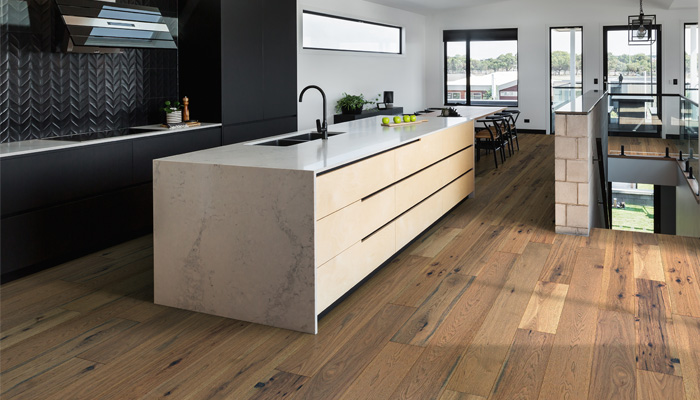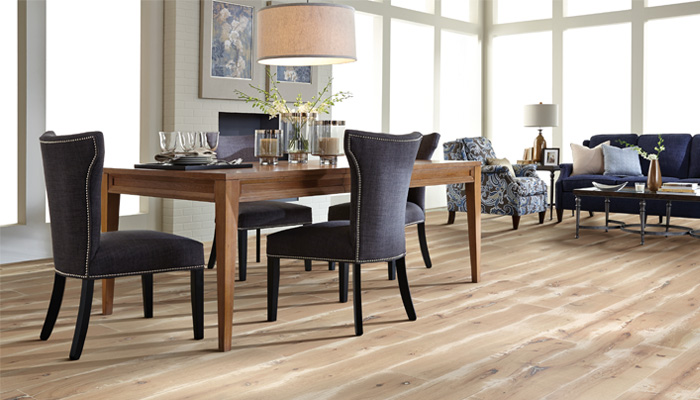Jun 18, 2025 | Flooring America

Engineered hardwood flooring isn’t just a surface, it’s what makes your house feel like home. Made with quality and sustainability in mind, it’s a choice you can feel proud of. It combines the timeless look of natural wood with modern durability, making it perfect for your lifestyle.
Whether you’re updating a room, creating a cozy space, or building your dream home, engineered wood flooring adds style, warmth, and strength. Let us help you find the perfect fit for your home!
Engineered hardwood stands out for its durability, beauty, and practical advantages. Here’s why it might be the perfect fit for your home and lifestyle:
Made by layering real wood with plywood, engineered flooring brings the warmth and elegance of solid wood while offering extra resistance to moisture and temperature changes. This makes it a smart choice for spaces like basements and kitchens, where traditional hardwood might not hold up.
Thanks to its multi-layered construction, engineered hardwood is designed to resist warping and bowing over time. With proper care, your floors can last 20–30 years, standing up to daily family life and even the occasional game of fetch with a beloved pet.
Engineered hardwood can be installed on most grade levels, making it a flexible option for varied home designs. Plus, cleaning is a breeze, just regular sweeping and the occasional damp mop keep it looking its best. Review your warranty carefully before attempting any DIY solutions.
Caring for the planet is a priority for many families, and engineered hardwood helps take some of the weight off. Its layered construction uses less wood than solid hardwood, making it an environmentally conscious choice without sacrificing beauty or performance.
Available in a variety of trendy wood species like oak, hickory, and maple, along with finishes ranging from classic matte to high-gloss, this flooring easily complements any design aesthetic. Whether you’re aiming for rustic, modern, or somewhere in between, you’ll find a style that speaks to you.

When it comes to choosing between solid and engineered hardwood flooring, the decision often comes down to the unique needs of your space. Solid hardwood flooring, made from a single piece of wood, is ideal for those seeking a traditional, timeless aesthetic and the ability to refinish multiple times. Its durability makes it suitable for spaces with heavy foot traffic, provided it is installed above grade in a controlled environment.
Engineered hardwood, on the other hand, shines for its versatility and resilience. Thanks to its layered construction, featuring hardwood and plywood layers positioned in alternating directions, engineered hardwood is less prone to warping, bowing, or shrinking, even in areas with higher moisture or fluctuating temperatures. This makes it a standout choice for spaces like basements or kitchens, where solid hardwood might struggle.
Ultimately, both options bring a touch of sophistication and warmth to your home, so the perfect choice will depend on your lifestyle, room conditions, and personal style preferences. Whichever you choose, hardwood flooring remains a reliable and beautiful investment that will enhance your home for years to come.
Engineered wood flooring typically ranges from 3/8” to 3/4” thick, while solid hardwood is generally 1/2” to 3/4” thick. This makes engineered hardwood a versatile choice that provides ample durability and stability for various room conditions.
With proper care, engineered hardwood floors can last between 20 and 30 years. Key factors influencing longevity include the thickness of the veneer layer, the overall quality of the flooring, and how well the floors are maintained. Thanks to modern advancements in manufacturing techniques, engineered hardwood can even be installed in moisture-prone areas like basements and bathrooms when combined with a protective moisture barrier and proper precautions.
While the top layer of engineered hardwood is real wood, making it naturally beautiful, it can also be susceptible to scratches, just like solid hardwood. To minimize scratching, look for engineered wood floors with a durable, scratch-resistant finish. Minor scratches can often be repaired with a wax repair kit or by gently buffing the area with a soft cotton cloth and a small amount of alcohol. Be sure to check your product warranty for specific guidance before proceeding. Taking simple steps, like using area rugs or furniture pads, can further protect your floors.
Your flooring reflects your style and sets the stage for life’s most meaningful moments. Engineered hardwood is designed to provide lasting strength and dependability for life’s everyday moments. Let us guide you in choosing the perfect option.
Ready to transform your space? Order samples or try our room visualizer to see how engineered hardwood can bring warmth and character to your home. Explore our collection or visit our showroom to get started today!